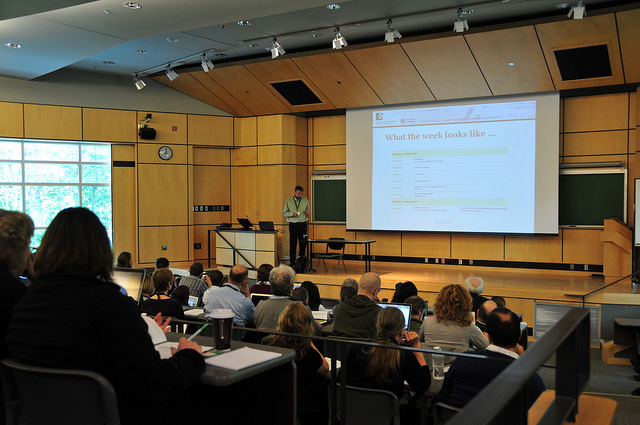The digital humanities offer an exciting opportunity to engage in interdisciplinary methods and apply digital tools to humanistic research. However, developing these skills while balancing coursework, research, and instruction during the academic year can be a challenge. The Digital Humanities Summer Institute at the University of Victoria brings together experts from a variety of institutions to offer 5-day intensive workshops on topics such as TEI encoding, text analysis, mapping, network visualization, developing a digital documentary edition, and digital pedagogy. Last summer, Berkeley became a sponsor for DHSI and offered free or discounted tuition to ten faculty and graduate students. On October 2, DH @ Berkeley and the Berkeley Center for New Media hosted a brownbag lunch for DHSI attendees to report back and share their experiences with prospective attendees.
Yairamaren Roman Maldonado, a graduate student in the Spanish & Portuguese Department, attended “Introduction to Electronic Literature in DH: Research and Practice”. The course included an intensive introduction to electronic literature, its critique, and how to teach it. Collaborating with other participants, Yairamaren returned from DHSI with plans for an e-lit exhibit at UC Berkeley.
Stephanie Moore, an English department graduate student who enrolled in “Visual Design for Digital Humanities”, appreciated the project-based focus of her course. Charged with designing a new interface for a scholarly project originally developed in the late 90s, Stephanie benefited from individual consultation with her instructors.
Cammeron Girvin, a graduate student in Slavic Languages and Literatures who took “Fundamentals of Programming” described DHSI as a good stepping stone towards future technical training. Next summer, he hopes to take a course on databases.
Most of the attendees found that taking a week to focus on technical training was a welcome break from the variety of obligations they juggle during the semester. Cindy Nguyen, a PhD student in the History Department who took “Geographical Information Systems in the Digital Humanities” compared learning technical skills to learning a new language. “I learn much more effectively at summer intensives than when I do when I’m doing a little bit, 3 hours a week.”

DHSI 2010 | Credit: John Unsworth
Hosting over 600 attendees, DHSI is one of the largest annual gatherings of digital humanists in North America. Whether it was through classes, lunchtime “unconferences”, or poster sessions, attendees agreed that DHSI offered opportunities to connect with members of the global digital humanities community. Alex Saum-Pascual, a professor in the Spanish and Portuguese department who has attended DHSI several times, explained that she enjoyed being in an immersive, focused learning experience where people were at different points in their academic career. Cindy, who had been involved with digital humanities in her Master’s degree program, was able to catch up with far-flung colleagues. Cammeron found that the camaraderie fostered by intensive training facilitated making new connections across disciplinary boundaries. Stephanie, who joked that she “attended to figure out what the digital humanities are” and did not identify as a digital humanist prior to attending DHSI, noted that the DHSI Colloquium poster sessions were a great way to discover a breadth of work going on in the digital humanities.
Attending DHSI 2015
Berkeley will once again be a sponsoring institution for DHSI 2015. Faculty, graduate students, and academic staff can apply for free tuition to DHSI; details are available here, and applications will be accepted through October 20th. Individuals who are not selected for the tuition voucher can still take advantage of the discounted tuition available for all UC Berkeley faculty, students and staff ($300 for students, $650 for non-students), using our sponsor code. Travel bursaries for graduate students may also be available through the Association for Computers and the Humanities (ACH).
Not sure where to start? Read Scott Paul McGinnis’ advice on selecting a DHSI course. Looking for training now? Contact a digital humanities consultant to find training at Berkeley.